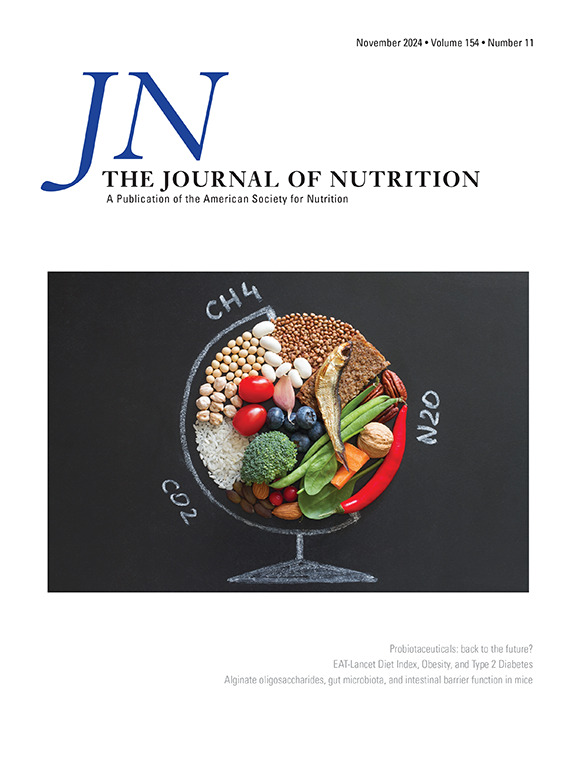咖啡消费与食管鳞状细胞癌的风险:日本一项基于人群的前瞻性队列研究。
IF 3.8
3区 医学
Q2 NUTRITION & DIETETICS
引用次数: 0
摘要
背景:饮用咖啡可能由于其化学成分而具有保护作用,也可能由于食管鳞状细胞癌(ESCC)的热损伤而有害。然而,证据仍然不一致,因为不同的研究报告的结果从保护作用到饮用咖啡使食道癌风险增加三倍不等。这种联系可能在喜欢热饮和不喜欢热饮的人之间有所不同。目的:为了区分咖啡对ESCC的影响和热损伤,我们根据饮料温度偏好研究了咖啡摄入量与ESCC之间的关系。方法:这项基于人群的前瞻性队列研究使用了1990年日本公共卫生中心前瞻性研究的数据。总共有103932名年龄在40-69岁之间的参与者参与了这项研究。咖啡消费和热食物或饮料偏好是通过基线问卷自我报告的。截至2013年,ESCC的发病率是通过对癌症登记处的积极监测确定的。根据热食或饮料偏好分层评估咖啡消费与ESCC之间的关系。分析了咖啡与热食物或饮料偏好组合与ESCC风险之间的联合关系。结果:在平均18.7年的随访期间,确定了434例ESCC患者。咖啡摄入与ESCC风险无显著相关(≥3杯/天的HR: 0.84;95% ci, 0.58-1.20)。偏好热食或热饮者的相关性无统计学意义(HR≥3杯/天:0.90;95%CI, 0.48-1.69),而非(HR 1.40, 95%CI, 0.80-2.48)。联合关联分析显示无明显关联。当排除前三年随访中诊断出的ESCC病例时,结果相似。结论:这项基于人群的前瞻性研究没有发现强有力的证据支持咖啡消费与ESCC之间的联系,无论是在喜欢热饮还是不喜欢热饮的个体中。本文章由计算机程序翻译,如有差异,请以英文原文为准。
Coffee Consumption and Risk of Esophageal Squamous Cell Carcinoma: A Population-Based Prospective Cohort Study in Japan
Background
Coffee consumption can be protective owing to its chemical compounds or harmful because of thermal injury in esophageal squamous cell carcinoma (ESCC). However, evidence remains inconsistent, as different studies have reported results ranging from protective effects to a 3-fold increase in esophageal cancer risk with coffee consumption. The association may differ between individuals who prefer hot beverages and those who do not.
Objectives
To distinguish the effects of coffee from thermal injury, we examined the association between coffee consumption and ESCC according to beverage temperature preferences.
Methods
This population-based prospective cohort study used data from the Japan Public Health Center-based Prospective Study from 1990. Overall, 103,932 participants aged 40–69 y were included in the study. Coffee consumption and hot food or beverage preference were self-reported using baseline questionnaires. The incidence of ESCC until 2013 was identified through active surveillance of cancer registries. The association between coffee consumption and ESCC was assessed by stratification according to hot food or beverage preference. The joint association between the combination of coffee and hot food or beverage preference and ESCC risk was analyzed.
Results
During a mean follow-up of 18.7 y, 434 patients with ESCC were identified. Coffee consumption was not significantly associated with ESCC risk [hazard ratio (HR) for ≥3 cups/d: 0.84; 95% confidence interval (CI): 0.58, 1.20]. The associations were not statistically significant among those who preferred hot food or beverages (HR for ≥3 cups/d: 0.90; 95% CI: 0.48, 1.69) and those who did not (HR: 1.40, 95% CI: 0.80, 2.48). Joint association analysis revealed no clear association. The results were similar when ESCC cases diagnosed within the first 3 y of follow-up were excluded.
Conclusions
This population-based prospective study did not find strong evidence supporting an association between coffee consumption and ESCC, either among individuals who preferred hot beverages or those who did not.
求助全文
通过发布文献求助,成功后即可免费获取论文全文。
去求助
来源期刊

Journal of Nutrition
医学-营养学
CiteScore
7.60
自引率
4.80%
发文量
260
审稿时长
39 days
期刊介绍:
The Journal of Nutrition (JN/J Nutr) publishes peer-reviewed original research papers covering all aspects of experimental nutrition in humans and other animal species; special articles such as reviews and biographies of prominent nutrition scientists; and issues, opinions, and commentaries on controversial issues in nutrition. Supplements are frequently published to provide extended discussion of topics of special interest.
 求助内容:
求助内容: 应助结果提醒方式:
应助结果提醒方式:


